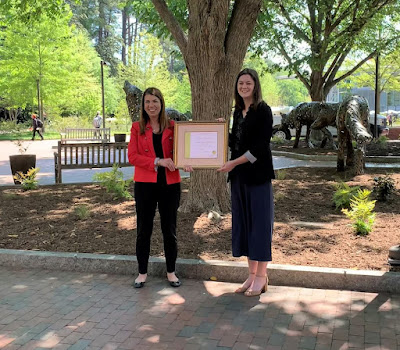 |
| From Left: Secretary Biser, Renee Strnad, Dr. Daniels, Grace Baucom, Dr. Floyd, Eva Feucht and Dr. Jones |
North Carolina Department of Environmental Quality Secretary, Elizabeth S. Biser joined Dr. Myron Floyd, Dean, College of Natural Resources and Dr. Harry Daniels, Senior Associate Dean, College of Agriculture and Life Sciences at NC State University this morning to present senior Grace Baucom with her NC Environmental Education Certificate. Grace is earning a double major in Extension Education from the Department of Agricultural and Human Sciences and in Agroecology & Sustainable Food Systems from the Department of Crop and Soil Sciences, both in the College of Agriculture and Life Sciences. Her concentration is Community Food Systems within the Agroecology & Sustainable Food Systems degree.
Eva Feucht, Director, Park Scholarships Program was also in attendance to recognize Grace who is Park Scholar. The Park Scholarships Program brings exceptional students to NC State, based on outstanding accomplishments and potential in scholarship, leadership, service, and character.
Grace has three minors--in Environmental Education, Parks, Recreation, and Tourism Management and Spanish. NC State is the only university to offer a minor in environmental education and DEQ partners with the minor program to make environmental education certification available to students. The minor is a collaboration between the College of Natural Resources and the College of Education. Kathryn Stevenson, Associate Professor, College of Natural Resources, Renee L Strnad, Extension Forestry, College of Natural Resources and Dr. Gail Jones, Alumni Distinguished Graduate Professor in the College of Education were present to celebrate Grace’s accomplishment.
“It is an honor to award Grace with her Environmental Education Certification. I was so impressed with all her accomplishments at NC State, and I know I will be seeing more of Grace in the future as she pursues her career goals,” noted Secretary Biser upon presenting the certificate.
Grace is active in the campus community as a Food-Inspired Resilience and Equity Intern for the Center for Environmental Farming Systems, and as a Communications Assistant for the Agricultural and Human Sciences Department. She is passionate about asset-based community development, nonformal education, and program evaluation. She lives with her family, along with a menagerie of pets, plants, livestock, and honeybees, on a small homestead outside of Chapel Hill, North Carolina. In her personal time, she enjoys photography, crafting, listening to podcasts, and going for very long walks – her record so far is a half marathon.
Grace says her favorite part of earning her certification was visiting Environmental Education Centers. “I loved having the opportunity to explore a variety of state parks, museums, and EE centers across the state, and meet wonderful current and aspiring Environmental Educators while doing it.” Relatedly, attending the 2020 virtual Environmental Educators of North Carolina Conference was a highlight.When asked what experience in the program stood out, Grace said it was during the Spring 2021 semester when she took "Environmental Education in Practice," a NC State course taught by Dr. Kathryn Stevenson and Lauren Gibson.
Grace’s partnership project requirement continues to have positive community impacts: “I completed my community partnership project during the summer of 2020, in response to a community need for virtual resources that could help young students experience the outdoors during the early stages of COVID-19. I researched, filmed, and edited a 10-minute educational video about honeybees, using my family's farm and hives as my "set." This project was in partnership with Orange County Cooperative Extension's 4-H Youth Development Program. In addition to sharing the finished video on their YouTube channel, they included my video in a Farm to School curriculum for fourth grade students in Orange and Person Counties. In this way, my project was able to directly reach hundreds of young students, and provide a means of incorporating nature exploration into remote learning.” Link to video: https://www.youtube.com/watch?v=xe-TQjxyflg&feature=youtu.be
Grace notes that participating in the EE Certification program
was instrumental in the development of her nonformal education philosophy. “It
has allowed me to explore and implement environmental education lesson design
in accordance with best practices, it sparked my interest in program
evaluation, and it taught me the critical importance of culturally and
developmentally appropriate instruction. I now approach teaching through the
lens of growth and exploration, and I've been motivated to explore career paths
in evaluation, lesson and curriculum design, and educational communication.”
Grace also felt the program gave her new perspectives on the environment and
environmental education. “After participating in the certification program, I
think about environmental issues with more nuance, and I'm highly aware of
framing and context: I pay closer attention to what information is provided –
and left out – of articles and speeches about these issues, and what inclusion
or omission might suggest. I am also more focused on systems-level change, and
I have an increased understanding of conversation science, as well as the
distinction between education and advocacy.”

